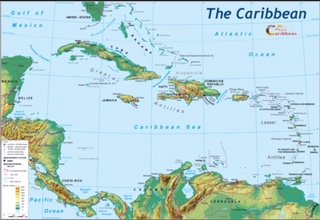The British-Caribbean connection is one of the most profound and enduring relationships in the region’s history. The British Empire played a major role in shaping the Caribbean, from the era of colonization and the transatlantic slave trade to modern-day diplomatic, economic, and cultural ties. Today, several Caribbean nations maintain links to the United Kingdom, whether through membership in the Commonwealth, shared institutions, or strong diaspora connections.
Britain’s Colonization of the Caribbean
The British first arrived in the Caribbean in 1623, establishing a colony on St. Kitts before expanding their influence across the region. Over the centuries, Britain controlled several Caribbean territories, including:
• Jamaica (1655)
• Barbados (1627)
• Trinidad and Tobago (1797)
• The Bahamas (1718)
• Belize (formerly British Honduras) (1862)
• Guyana (formerly British Guiana) (1814)
• St. Lucia, St. Vincent and the Grenadines, Antigua and Barbuda, Dominica, Montserrat, Anguilla, the British Virgin Islands, and the Cayman Islands
The British Caribbean Economy: Sugar and Slavery
• The sugar plantation economy was at the heart of British Caribbean colonies, making the region vital to Britain’s global wealth.
• The British were major players in the transatlantic slave trade, transporting millions of enslaved Africans to the Caribbean to work on sugar, tobacco, and cotton plantations.
• The abolition of slavery in the British Empire in 1834 led to the introduction of indentured laborers from India and China, further shaping Caribbean society.
The Road to Independence
• After World War II, Caribbean nations began pushing for independence and self-governance.
• The West Indies Federation (1958-1962) attempted to unite British Caribbean territories, but it collapsed due to political differences.
• Most British Caribbean colonies gained independence between the 1960s and 1980s, while some remain British Overseas Territories today.
British Influence in the Caribbean
Even after decolonization, British influence remains strong in various aspects of Caribbean life, including politics, language, culture, and sports.
1. Political and Legal Systems
• Many former British colonies still use the Westminster parliamentary system of government.
• Some Caribbean nations, including Jamaica, The Bahamas, Barbados (until 2021), and Belize, have King Charles III as head of state.
• The Caribbean Court of Justice (CCJ) is slowly replacing the UK’s Privy Council as the final court of appeal for some nations.
2. Language and Education
• English is the official language in most Caribbean countries due to British rule.
• The British education system influenced Caribbean schooling, with CXC (Caribbean Examinations Council) exams similar to British GCSEs and A-Levels.
3. Culture, Religion, and Traditions
• Christianity, particularly Anglicanism, remains a dominant religion in many British Caribbean nations.
• British customs, such as Afternoon Tea, Boxing Day, and British-style etiquette, have been preserved in some areas.
4. Sports: The British Sporting Legacy
• Cricket is the most enduring British sporting influence, with the West Indies cricket team becoming a powerhouse in the 20th century.
• Football (soccer), netball, and rugby are also widely played across the region.
Modern-Day Relations Between Britain and the Caribbean
1. The Commonwealth and Diplomatic Ties
• Many former British Caribbean colonies are part of the Commonwealth of Nations, maintaining close ties with the UK.
• The UK provides financial aid, disaster relief, and trade support to Caribbean nations.
2. British Overseas Territories in the Caribbean
• Some Caribbean islands remain British Overseas Territories, meaning they are still under British rule:
• Anguilla
• Bermuda
• British Virgin Islands
• Cayman Islands
• Montserrat
• Turks and Caicos Islands
• These territories have local governments but rely on Britain for defense, foreign affairs, and financial assistance.
3. The UK-Caribbean Diaspora Connection
• The “Windrush Generation” (1948-1971) saw thousands of Caribbean people migrate to the UK to help rebuild after WWII.
• Today, there is a large Caribbean diaspora in the UK, particularly in cities like London, Birmingham, and Manchester.
• Caribbean culture—music, food, and festivals—has enriched British society, seen in events like the Notting Hill Carnival.
Challenges and Controversies in UK-Caribbean Relations
1. Calls for Reparations and Apologies for Slavery
• Caribbean nations have demanded reparations from the UK for the transatlantic slave trade.
• The CARICOM Reparations Commission has pushed Britain to acknowledge its role and compensate Caribbean nations.
2. The Monarchy Debate
• Some Caribbean nations, like Barbados (2021), have removed the British monarch as head of state, and others (Jamaica, Belize) are considering doing the same.
3. UK Immigration Policies and the Windrush Scandal
• Many Caribbean migrants who helped rebuild Britain were wrongly detained or deported due to strict immigration policies.
• The UK government later apologized and launched a compensation scheme, but controversy remains.
The British connection to the Caribbean is a deep and complex relationship shaped by colonization, culture, and modern diplomacy. While Caribbean nations have gained independence, they continue to share strong political, economic, and cultural ties with the UK.
As the Caribbean moves forward, the future of its relationship with Britain will depend on economic partnerships, immigration policies, and discussions on historical justice. Despite past challenges, the British-Caribbean bond remains significant, influencing both regions in profound ways.

